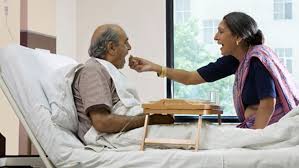Is your family member suffering from a chronic physical or mental health illness? If so, do you feel stressed or burdened by it? If so, then this blog may be useful for you!
When one family member is diagnosed with a chronic illness, the illness has a prism effects on the entire family. Chronic illnesses could be Physical Health problems, such as Heart Disease, Genetic Disease, and Cancer, or Mental Health problems such as Depression, Bipolar disorder, Obsessive Compulsive Disorder, and Anorexia Nervosa.
Chronic physical illnesses can also lead to mental health problems for the client/ patient and his/her family. Typically in such cases, the individual diagnosed with the illness gets treatment through medication and/or therapy. However, the mental health of the support network of family members is often dismissed. The family members take the role of caregivers by providing support, arranging doctor visits, medication etc. The core family, depending on their proximity to the client/patient, are affected in such situations in many ways. The physical and mental strain of a caregiver can lead to feelings of stress, exhaustion, denial, anger, frustration, guilt, or depression. This is why the treatment plan should include therapeutic relief for the network of family that are the caregivers.
This was a major point of discussion at the recent conference of the Indian Association of Family Therapy attended by doctors, psychologists, counsellors and affected family members. There, we found that for chronic physical illnesses, such as genetic disease and cancer, the family members who provide support and seek help through other forums, prove to be more beneficial in the recovery of the patient, as well as for the rest of the family. So, it is very important for the care givers to join support groups, talk to other families going through a similar situation, share experiences with other families, strengthen the core of your family, and divide the roles among family members. It is important that one person should not try to do everything. Dr. Manoj of CANSUPPORT cited two similar cases of adolescents diagnosed with cancer, one from wealthy family with all resources at their hands and the other who was from a diametrically opposite background. Yet, recovery was faster for the later due to higher family and community support.
So, if your own family member has a chronic physical or mental illness, you are at risk for developing mental health problems, as well. You can minimize such problems by joining support groups or seeking therapy. It is beneficial to recognise these symptoms and take charge early on. Family therapy can be extremely beneficial to elevate related symptoms by helping you identity and develop coping skills. At times, mental health problems also stem from unsettling family dynamics. Young children from ages 4 and above tend to imitate and model unhealthy social behaviour patterns just because they observe an adult doing them Since there are high chances of both chronic physical and chronic mental health problems to be genetic, it becomes increasingly necessary to seek therapeutic relief. Chronic illnesses bring about a change not only in the person affected by it but also the family living with that individual. At times, if not the illness, the personality changes that come along with the illness can create problems in relationships. If such illnesses have created barriers in your relationship with your family, spouse, parent, sibling or child, seek therapy to repair, strengthen or revitalize your relationship.



